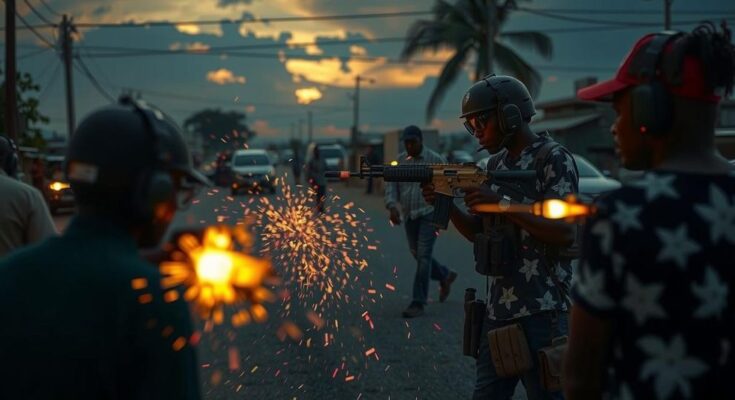Gunfire broke out in Juba after a failed arrest of former NSS head Akol Koor Kuc, following his dismissal by President Kiir. The incident reflects ongoing power struggles ahead of postponed elections, raising concerns over the stability in South Sudan. Army officials claim Kuc was not arrested, as he remained at home during the unrest.
Heavy gunfire erupted on the evening of Thursday in Juba, the capital of South Sudan, following a security operation aimed at arresting the former head of the National Security Service (NSS), Akol Koor Kuc. Witnesses reported that the shooting commenced around 7 p.m. local time, persisting irregularly for over an hour. According to a United Nations safety alert, the unrest was linked to ongoing tensions surrounding the attempted arrest, prompting U.N. staff to remain indoors as precautionary measures.
The incident followed President Salva Kiir’s recent dismissal of Koor Kuc, who had assumed leadership of the NSS since South Sudan’s independence in 2011, and his replacement with a trusted associate. In contrast, Army spokesperson Major General Lul Ruai Koang stated that Koor Kuc had remained at home throughout the shooting incident and would provide further updates following a scheduled meeting with security officials. Political analysts indicate that Koor Kuc’s dismissal signifies a deeper power struggle within the South Sudanese government, particularly in light of the delayed elections, which had been anticipated for December but have now experienced a second postponement.
Since the civil strife that raged from 2013 to 2018, resulting in a devastating toll of hundreds of thousands of lives, President Kiir and First Vice President Riek Machar have led a transitional government. Despite periods of relative calm, sporadic clashes between their factions and various armed groups continue to disrupt peace in rural regions, emphasizing the fragile stability that currently characterizes the nation.
The recent outbreak of violence in Juba stems from internal political tensions following the dismissal of Akol Koor Kuc, a significant figure in South Sudan’s intelligence community. His removal is emblematic of the ongoing power struggles within the government as factions vie for influence. Since the conclusion of the civil war, efforts have been made to cultivate a stable governance structure; however, the current political climate remains precarious, with intermittent violence jeopardizing peace initiatives.
In summary, the heavy gunfire in Juba highlights the fragile political landscape of South Sudan, particularly following significant leadership changes within the National Security Service. The disturbance not only underscores ongoing power struggles but also reflects broader issues of governance and stability in the nation. With elections postponed, the potential for violent confrontations remains ever-present, necessitating cautious observation by both national and international entities.
Original Source: www.usnews.com




